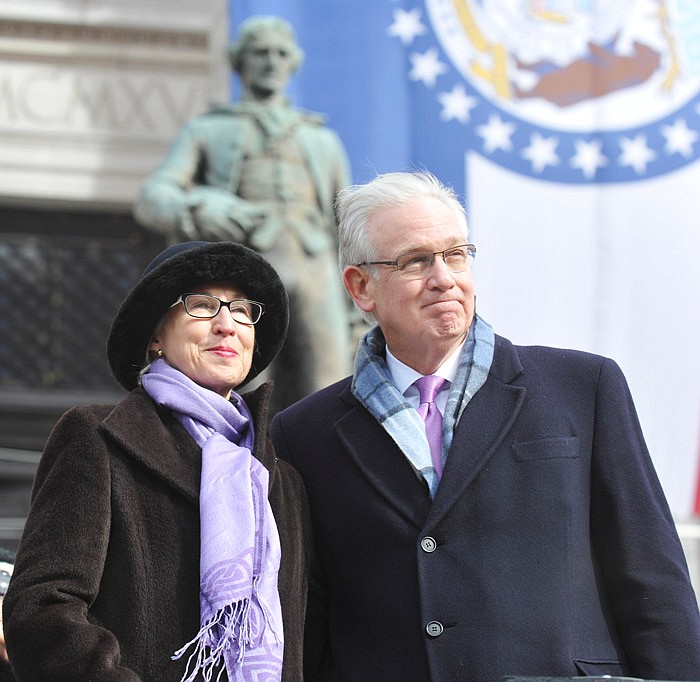Former Gov. Jay Nixon said his eight years in office focused on "Building a Stronger Missouri."
And that's the title of an 88-page booklet issued last week as Nixon's last official act as governor.
The Missouri Constitution requires the governor to give a report to the General Assembly at the commencement of each session - what we generally know as the State of the State address - and at the close of his term of office.
In the booklet's introductory letter, written before he left office, Nixon said, "Together, we've made great strides: recovering from the worst economic downturn since the Great Depression, helping communities rebuild after natural disasters, and making transformative investments to strengthen our public schools, hold down college tuition, improve our state parks and help Missourians with mental illness and developmental disabilities live with dignity and hope."
The report is focused on the highlights of his administration but includes several references to "working in a bipartisan way" with lawmakers and others to accomplish some of the measures and initiatives included in the report.
The former governor said one highlight was "smart fiscal management," with key accomplishments including reducing state spending by $2.3 billion and the state's workforce by 5,095 positions and having Missouri's AAA credit rating, from all three rating agencies, reaffirmed 26 times.
Republicans controlled the Legislature throughout Nixon's eight years in office, and the two sides constantly argued over tax-cutting proposals.
In the former governor's report, Nixon said his administration's "fiscally responsible tax relief" included the elimination of 75 boards and commissions and their 970 appointed positions.
The consolidation and refinancing of existing state debt saved taxpayers $141.8 million, he said.
Nixon said his administration also worked on growing the economy, with key accomplishments including cutting the state's unemployment rate by half, from nearly 10 percent in 2009 to 4.7 percent by last November.
The report also said Missouri "led the nation in new business formations," was sixth-best in the U.S. for "annual advanced manufacturing industry job growth" and received an A for its corporate tax index.
Exports, Nixon said, increased by 43 percent over the 2009 levels when he began serving as governor, to more than $13.6 billion in exported products in 2015.
Nixon also reported his administration focused on "increasing educational opportunity," including raising the state's contributions to elementary and secondary education through the state-aid distribution formula by "nearly $400 million," resulting in "record funding" for K-12 education and a high school graduation rate among the nation's top 10 states.
Nixon said his team also increased higher education funding, and through agreements with the state's colleges and universities, Missouri was "number one in the nation for holding down tuition increases."
And the Nixon administration reported it "expanded access to early childhood education" during his eight years in office.
Another area of concern was helping Missouri families and communities be healthier, the report said, including helping "low-income seniors and Missourians with disabilities afford prescription medications through the Missouri Rx program," and adding health benefits for 140,000 children through the Missouri HealthNet program, which uses Medicaid funding.
Nixon's Strengthening Mental Health initiative made "transformative investments in caring for Missourians with mental health challenges," the report said, including placing "31 community mental health liaisons statewide, to work with law enforcement and court personnel to connect people in behavioral health crises to treatment."
Working the Legislature, Nixon's administration also worked to replace the Fulton State Hospital with a new, modern facility.
Nixon's report also focused on disaster relief efforts, municipal court reform following the demonstrations and violence in the wake of Michael Brown's death by a Ferguson police officer, promoting outdoors and tourism activities, and continued support for veterans, farmers and their families.

